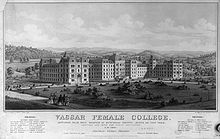Jean Webster
Initially, the business was successful and, when Alice was five, the family moved to a large brownstone in New York, with a summer house on Long Island.
Webster and Crapsey supported the socialist candidate Eugene V. Debs during the 1900 presidential election, although as women they were not allowed to vote.
She traveled with two fellow Vassar students, and in Paris met Ethelyn McKinney and Lena Weinstein, also Americans, who were to become lifelong friends.
She also wrote columns about her travels for the Poughkeepsie Sunday Courier and gathered material for a short story, "Villa Gianini", which was published in the Vassar Miscellany in 1901.
Webster started writing the short stories that would make up Much Ado about Peter, and with her mother visited Italy for the winter of 1903–1904, including a six-week stay in a convent in Palestrina, while she wrote the Wheat Princess.
[1] The following years brought a further trip to Italy and an eight-month world tour to Egypt, India, Burma, Sri Lanka, Indonesia, Hong Kong, China and Japan with Ethelyn McKinney, Lena Weinstein and two others, as well as the publication of Jerry Junior (1907) and The Four Pools Mystery (1908).
McKinney responded to these stresses with frequent escapes on hunting and yachting trips as well as alcohol abuse; he entered sanatoriums on several occasions as a result.
Webster's most famous work originally was published as a serial in the Ladies' Home Journal and tells the story of a girl named Jerusha Abbott, an orphan whose attendance at a women's college is sponsored by an anonymous benefactor.
Apart from an introductory chapter, the novel takes the form of letters written by the newly styled Judy to her benefactor.
[1] Webster dramatized Daddy-Long-Legs during 1913, and in 1914 spent four months on tour with the play, which starred a young Ruth Chatterton as Judy.
The book and play became a focus for efforts for charitable work and reform; "Daddy-Long-Legs" dolls were sold to raise money to fund the adoption of orphans into families.
In June 1915, Glenn Ford McKinney was granted a divorce, and he and Webster were married in a quiet ceremony in September in Washington, Connecticut.
They honeymooned at McKinney's camp near Quebec City, Canada and were visited by former president Theodore Roosevelt,[5] who invited himself, saying: "I've always wanted to meet Jean Webster.
"[1] Returning to the U.S., the newlyweds shared Webster's apartment overlooking Central Park and McKinney's Tymor farm in Dutchess County, New York.
She suffered severely from morning sickness, but by February 1916 was feeling better and was able to return to her many activities: social events, prison visits, and meetings about orphanage reform and women's suffrage.
Glenn McKinney, recalled from his 25th reunion at Princeton University, arrived 90 minutes before Webster gave birth, at 10:30 p.m, to a six-and-a-quarter-pound daughter.
Webster's Dear Enemy mentions and summarizes the books approvingly, to some degree, although her protagonist, Sallie McBride, ultimately declares that she doesn't "believe that there's one thing in heredity," provided children are raised in a nurturing environment.
From her college years, Webster was involved in reform movements, and was a member of the State Charities Aid association, including visiting orphanages, fundraising for dependent children and arranging for adoptions.
In a chat with the bishop, Patty realizes that being irresponsible and evasive at a young age could adversely affect her character as an adult and decides to try to be a more responsible person.
